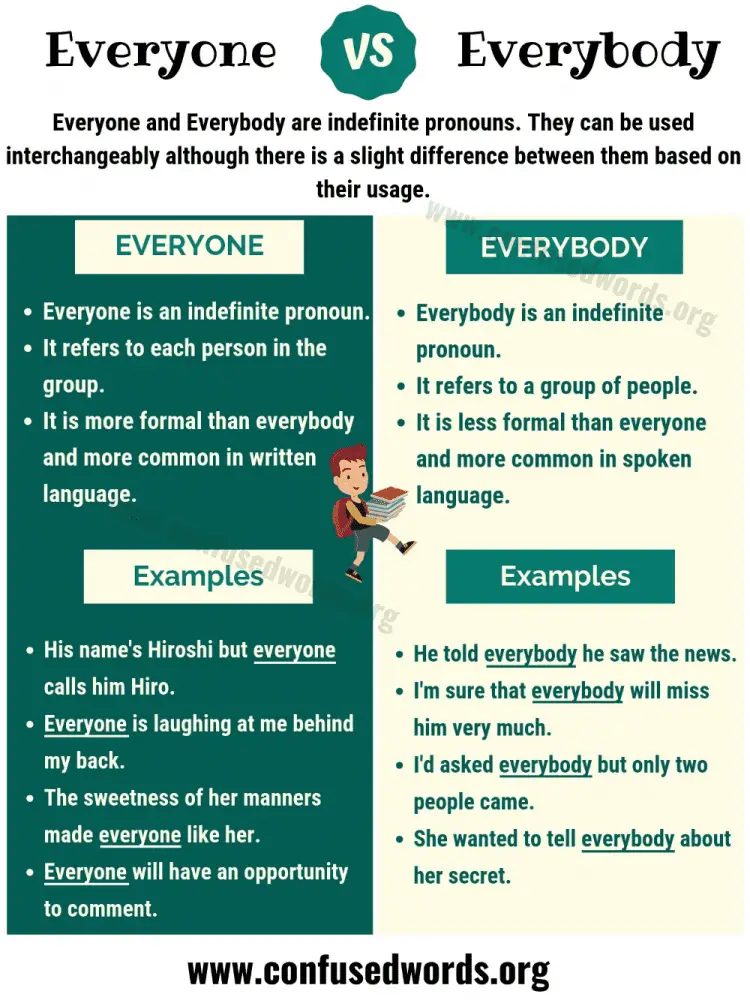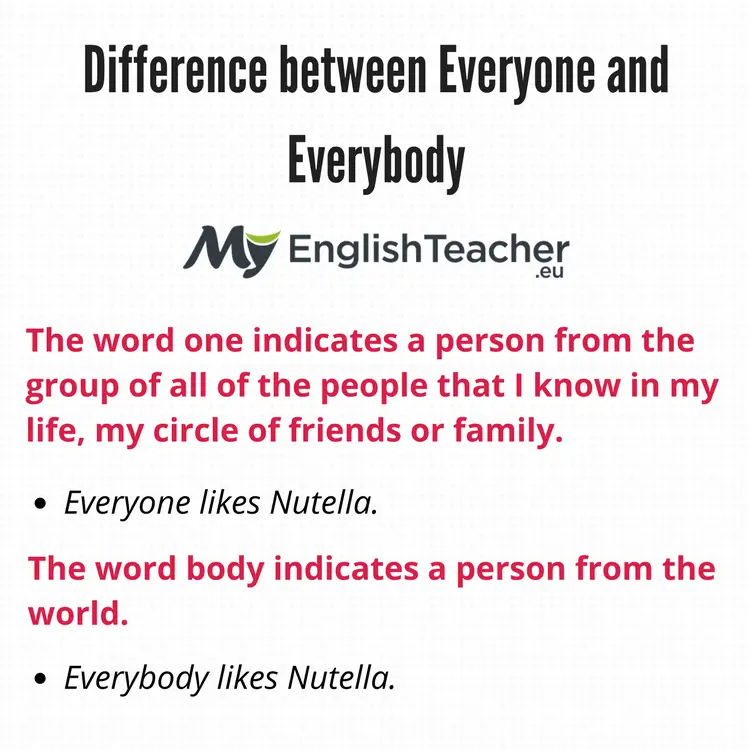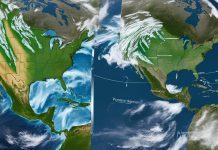Hello English learners!
I often get asked the following question by many of my students:
What is the difference between everyone and everybody?
The answer is a little complex but we can handle it. To help me illustrate this difference I am going to use the words someone and somebody.
If I use the sentence:
- Someone is at the door.
Someone is from a group of people that I know.
The chances that I know this person are very high. I most likely know this person. This would be appropriate to say if I were having a party and invited my friends. I would not know exactly who was at my door at that moment, but from all the people that I know in my life, this person is most likely from that group.
So, the word one indicates a person from the group of all of the people that I know in my life, my circle of friends or family.
For example,
- Everyone likes Nutella. (You mean to say that many people like Nutella)
On the other hand, if I use the sentence:
- Somebody is at the door.
Somebody could anybody in the world.
I am not expecting visitors and this is a surprise for me. I am indicating that I have no idea who could be at the door. It could be a salesman or a person asking for money. The word body indicates a person from the world.
- Everybody likes Nutella. (You are putting more emphasis on the number of people that like Nutella)
I would like to say that if you analyze the thought process or the psychology of the person, then you would understand a little more of what they are thinking.
Looking at the two sentences:
- Everyone likes Nutella.
- Everybody likes Nutella.
They both mean the same thing essentiality.
No one would argue with you about which one was correct. (Unless they did not like Nutella; then they would say it is not true.)

From the grand point of view, most English speakers don’t pay attention to which word they use.
However, from a subconscious level many English speakers would use one when they might be acquainted with the person and body when it could be a person that they are not expecting or do not know.
Another difference between the two words everyone and everybody is formality.
In more formal situations, it is better to use everyone.
[At a party where you might not know all the people at the party] Everyone should try the dessert.
Everybody sounds like you are talking about people who have bodies (which everyone has a body). “Everybody” is more appropriate when talking to friends.
[At a restaurant with your friends] Everybody, let’s take a picture.
There is no big difference in saying everyone or everybody. Everyone is more formal and everybody is more informal.
More for you:
Separate vs Seperate. What is the difference?
Next To vs In Front Of – MyEnglishTeacher.eu


























The second part of this seems a flat out contradiction to the first. You use everyone for people you know, but everybody when talking about the abstract/unknown. But then use everybody when casually talking with friends, and everyone in a formal group. Talk about convoluted.
Thank you Kirk! So, how would you explain the difference between everyone and everybody?
Great question… I’m not entirely sure – I found this page because I was googling an answer. LOL.
I was writing a short story for class, and for some reason was agonising over this one word (I went with “everyone”, because it just sounded better in the particular sentence I was writing).
I’ve seen a few sites make the same declaration as here about formal/informal uses, but on reflection, I think they’re all wrong. It seems that “everybody” is more abstract whereas as “everyone” is more personal.
That said, I do think the “everyone” works better in the formal situation above – but not because it’s more formal, but because it’s more *polite* (you act personal at such gatherings). “Everybody” refers to the masses, whereas “everyone” seems to be talking to you lot right here.
Of course, if that’s the case, why does “everybody” work better with friends? In that case, I’d argue it’s a case of exclusivity rather than informality. When it comes to friends – they’re everybody who’s anybody.
So:
everybody = abstract/universality OR exclusivity (nobody else matters)
everyone = personal/localised OR poiteness (everyone in this room)
But I’m probably overanalysing now. Just do what I ended up doing in my story, and use whichever sounds better.
Sometimes it is necessary to dig a bit deeper. Well, thank you for your explanation!
It is definitely a good point of view and sounds natural to me.
This is all nonsense. There is no meaningful difference (perceived or otherwise) and the words are synonymous. Use a good dictionary published from a reliable source (ie get a hard copy or online equivalent) instead of relying on the mass of confusing blogs and articles online concerning English grammar, vocabulary and usage, which is either misinformed, troll posting or simply made up to fill space in someone’s ego. The “explanations” are rarely quoted with sources to back up the information presented. Internet blogs are not suitable replacements for dictionaries if you want the correct and authoritative information.
“everybody”: pronoun, origin from EVERY + BODY, meaning “every person”
“everyone”: pronoun, origin from EVERY + ONE, = EVERYBODY
(Shorter Oxford English Dictionary, Sixth Edition, Volume 1, p 879, published by Oxford University Press 2007)
It took me a minute to look up and even less time to read. I had a clear, definitive answer. No vagueness, no ambiguity.
This definition says the same. Makes sense to me…
http://englishseeking.blogspot.com/2011/07/difference-between-everyone-and.html
To be honest, as someone from the United States myself, if you’re learning English, my advice is not to concern yourself with any “differences” between these words. They BOTH will sound natural in virtually any context, and no one (or nobody ;)) will ever look at you weird for using one over the other. Most native speakers couldn’t even tell the difference if you asked them. The one thing I’d say is that “every/some/any/no one” sounds a little cleaner and more formal than “every/some/any/no body” but that’s about it.
Thank you sooo much for this super useful addition Michael!
Attention: Brian Thornton.
This explanation is incorrect … everyone = everybody. These 2 words have exactly the same meaning!
Also someone = somebody; anyone = anybody; no one = nobody
“Noone” is a common misspelling of “no one,” which is two words, because “noone” looks awkward to pronounce.
However, every one (two words) is different from everyone (one word) and any one (two words) is different from anyone (one word) – look it up on internet!
I am a native English speaker and a volunteer ESOL teacher in Sydney, Australia.
Please fix these posts, or at least delete the 2nd one as it is absolutely incorrect without any further explanation of usage.
Thanks, RJ
Thanks for the teaching, it makes so much sense. Keep it up.
Thank you Aaron!